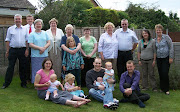At a time when we hear endless speculation about how to deal with the economic problems in the world, the regular email from the Sojourners contained this quote from Rabbi Michael Lerner,
[We need] to embrace a "new bottom line" in which corporations, social practices, government policies and individual behaviours are judged rational, efficient or productive not only if they maximize money or power, but also to the extent that they maximize love and caring, kindness and generosity, ethical and ecological sensitivity, enhance our capacity to treat others as embodiments of the sacred and to respond with awe, wonder, and radical amazement at the grandeur of the universe.
Tuesday 10 February 2009
Saturday 7 February 2009
By faith
At the moment I am half way through Eugene Peterson's book 'The Word made flesh'. The first part of the book observes the ten parables that are unique to Luke's Gospel and are part of what Peterson's describes as Luke's travel narrative(9:51-19:44). In describing the parable of 'Lazarus and the rich man', Peterson quotes NT Wright - 'the parable is not, as often supposed, a description of the afterlife, warning people to be sure of their ultimate destination.... the reality is uncomfortably different..... rather what was happening to both rich and poor in the present time. Jesus' welcome of the poor and outcast was a sign that the real return from exile, the new age, the 'resurrection', is coming into being; and if the new age is dawning, those who want to belong to it will have to repent'( 'Jesus and the Victory of God').
Peterson suggests that this parable "enlists our imagination to grasp more than our immediate feelings and surroundings - other lives, other circumstances, other possibilities. Once we are free of being stuck in the mud of our sinful, self-absorbed, self-contained "miry clay" of ego, our imaginations can be a catalyst for faith that the Spirit uses to create something out of nothing, the assurance of things hoped for, the conviction of "things not seen... that the worlds were prepared by the word of God, so that what is seen was made from things that are not visible"(Hebrews 11:1-3).( p116)
Peterson then quotes from his own paraphrase of these verses in The Message, - faith is "the firm foundation under everything that makes life worth living.... our handle on what we can't see... by faith, we see the world called into existence by God's word, what we see created by what we don't see."
Peterson suggests that this parable "enlists our imagination to grasp more than our immediate feelings and surroundings - other lives, other circumstances, other possibilities. Once we are free of being stuck in the mud of our sinful, self-absorbed, self-contained "miry clay" of ego, our imaginations can be a catalyst for faith that the Spirit uses to create something out of nothing, the assurance of things hoped for, the conviction of "things not seen... that the worlds were prepared by the word of God, so that what is seen was made from things that are not visible"(Hebrews 11:1-3).( p116)
Peterson then quotes from his own paraphrase of these verses in The Message, - faith is "the firm foundation under everything that makes life worth living.... our handle on what we can't see... by faith, we see the world called into existence by God's word, what we see created by what we don't see."
Monday 2 February 2009
Vocation or career?
Our Thursday evening group is looking at some excerpts from the life of the prophet Ezekiel. At the last meeting we pondered that part of the call of the prophet when he is instructed to 'eat the scroll' (3:1ff). Before that Ezekiel is reminded of how difficult his task as a prophet to his fellow exiles in Babylon would be. He is to proclaim the message whether they listen to him or not, for they are a stubborn and rebellious people. As a job description it is a complete turn off. But this may highlight the difference between a vocation and a career. Ezekiel is being called to this challenging task. He is not being given a career opportunity on which he can build.
On Sunday morning it was the Lectionary reading from the Gospel on which the sermon was based. Mark 1:21-28 is the account of Jesus teaching in the synagogue and dealing with the man who had 'an unclean spirit'. The authority of Jesus is at the centre of the story. The people recognise in the teaching of Jesus an authority unlike what they had experienced before. Jesus then acts with authority when confronted by the man. Within the Church community there are different views as to how we understand what was happening in the synagogue and how we understand the condition of the man. But it is interesting that we do still speak of 'possession'in our everyday language but not in terms of unclean spirits or demons. How often have we said to ourselves 'I don't know what possessed me to do that' or ask a similar question of others? What does possess us at times? What gets into us a times? Could it be 'self', 'career', 'money', 'power' or ????????
To ask that question perhaps prevents us from keeping this Gospel passage at arms length.
On Sunday morning it was the Lectionary reading from the Gospel on which the sermon was based. Mark 1:21-28 is the account of Jesus teaching in the synagogue and dealing with the man who had 'an unclean spirit'. The authority of Jesus is at the centre of the story. The people recognise in the teaching of Jesus an authority unlike what they had experienced before. Jesus then acts with authority when confronted by the man. Within the Church community there are different views as to how we understand what was happening in the synagogue and how we understand the condition of the man. But it is interesting that we do still speak of 'possession'in our everyday language but not in terms of unclean spirits or demons. How often have we said to ourselves 'I don't know what possessed me to do that' or ask a similar question of others? What does possess us at times? What gets into us a times? Could it be 'self', 'career', 'money', 'power' or ????????
To ask that question perhaps prevents us from keeping this Gospel passage at arms length.
Subscribe to:
Posts (Atom)




